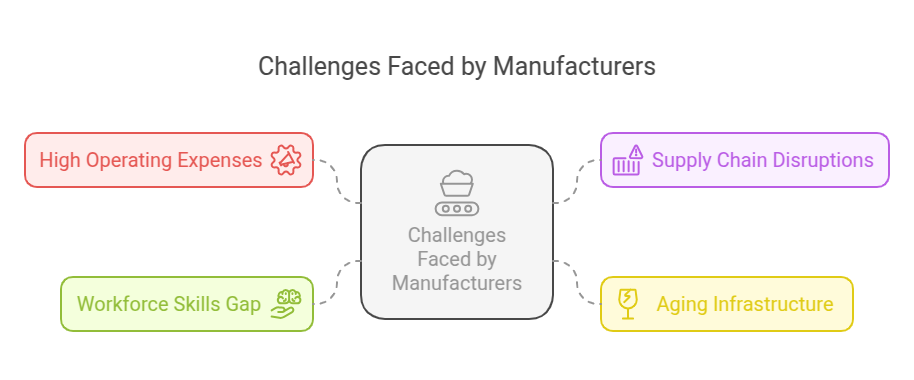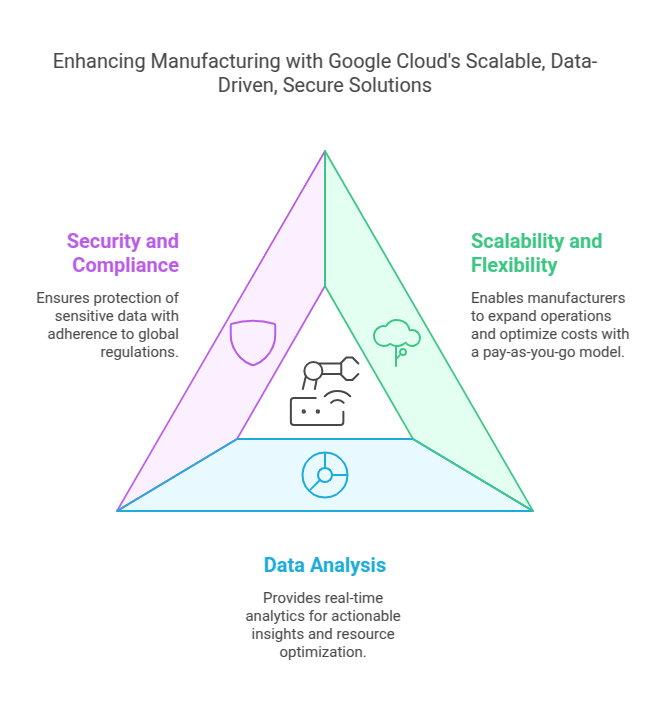

According to a report by McKinsey, manufacturers who fully integrate Industry 4.0 technologies can expect to see a 20-50% improvement in productivity and a 10-20% reduction in operational costs. Singapore and Malaysia’s manufacturing sectors are at a critical turning point. Manufacturers in the region face increasing demand to modernize their operations as global supply chains evolve and new technologies reshape industrial processes. In this blog, we will explore the manufacturing landscape in Singapore and Malaysia, understand the role of digital transformation, and the need for Google Cloud solutions in manufacturing.
Transform Manufacturing with Google Cloud
The adoption of cloud technology, edge computing, artificial intelligence, and machine learning is now a necessity. Google Cloud offers a range of solutions designed to help Malaysian and Singaporean manufacturers enhance productivity and resilience and drive innovation. These include smart factory solutions, data analytics, cybersecurity, supply chain optimization, sustainability & energy efficiency.
The Manufacturing Landscape in Singapore & Malaysia
Singapore and Malaysia are key manufacturers of the Southeast Asian region that significantly contribute to global supply chains. Using government-led programs, smart manufacturing, and digital transformation, both countries have strategically positioned themselves as the leaders in the advanced manufacturing sector.
- Smart manufacturing in Singapore: Singapore’s manufacturing industry is distinguished by the production of high-value products, precision engineering items, electronic gadgets, and biomedical supplies. Singapore’s Industry 4.0 gains are largely assisted by robust digital platforms and government-initiated Smart Industry Readiness Index (SIRI) programs that have boosted adoption. Singapore has emerged as a global leader in smart manufacturing due to its commitment to automation, robots, and AI integration.
- Industry 4.0 in Malaysia: Malaysia, on the other hand, is a top exporter of semiconductors, electronics, and automotive components. Industry4WRD is Malaysia’s national framework for Industry 4.0 to implement digital transformation activities across the country’s industrial industry. The nation benefits from expanded industrial park infrastructure, foreign investment, and government funding initiatives that improve manufacturing sustainability and efficiency.
Manufacturers in both countries still face several obstacles despite these developments.

Image 1: Challenges Faced by the Manufacturers
Challenges Faced by Manufacturers in the Region
- High Operating Expenses: The growth in labor costs and energy prices has compelled businesses to adopt automated smart manufacturing solutions. Organisations are increasingly turning to artificial intelligence optimisation and cloud-based technology to improve their operations and profitability.
- Supply Chain Disruptions: Real-time supply chain transparency has become critical in the wake of global interruptions caused by health crises and political conflicts. The present market requires manufacturers to create AI-based predictive analytics and digital twin technologies to decrease risks and improve logistical efficiency.
- Aging Infrastructure: Many factories use antiquated legacy system technology, limiting their capacity to undertake analytics for predictive choices. The use of smart manufacturing systems that leverage IoT technologies on cloud-based platforms improves factory operations. These systems provide greater flexibility and boost production speeds.
- Workforce Skills Gap: Professionals with experience in AI, IoT, and cloud technologies are in high demand due to the rapid pace of digital transformation. Manufacturers overcome the skills gap by cooperating with technology suppliers and academic institutions to teach their staff the skills required for Industry 4.0.
The Role of Digital Transformation in Driving Efficiency and Growth
To be competitive, firms must embrace digital change. Cloud computing, artificial intelligence, and data analytics enable:
- Improved Production Efficiency: Both predictive maintenance and real-time monitoring approaches minimise operational downtime while increasing productivity.
- Smart Supply Chain Management: The combination of digital twin technology and AI-driven forecasting systems enhances both logistics and inventory management tasks.
- Scalability and Flexibility: Cloud-based solutions enable firms to alter their operations in response to market demands while also allowing for flexible capacity growth.

Image 2: Why use Google Cloud for Manufacturing
Why Google Cloud for Manufacturing
Manufacturers may use Google Cloud for Manufacturing to have access to a comprehensive toolbox that optimises their company processes while also improving security standards and unlocking new inventive possibilities.
- Scalability and Flexibility for Modern Manufacturing: Google Cloud’s infrastructure enables manufacturers to easily expand operations as they explore new market deployments or adopt sophisticated technology. Manufacturers improve operational efficiency by using a pay-as-you-go strategy that enables resource allocation and cost optimisation.
- Data Analysis for Operational Efficiency and Decision Making: Manufacturers may benefit from Google Cloud’s BigQuery and Looker features, which provide real-time analytics that translate production data into actionable choices and optimised resource allocation.
- Security and Compliance Advantages: Manufacturers handle sensitive intellectual property and operational data. Google Cloud’s comprehensive security system adheres to ISO 27001 regulatory requirements, as well as GDPR and Singapore’s PDPA legislation.
Modernization of Infrastructure in Manufacturing
When transitioning to Industry 4.0, manufacturers must install current infrastructure systems in order to achieve both innovation and increased efficiency.
- Cloud Migration and Hybrid Cloud Approach: The migration of old systems to cloud-based settings improves business agility while decreasing IT expenditures. The Google Cloud Anthos allows manufacturers to construct hybrid or multiple cloud systems, facilitating the integration of local infrastructure with cloud-based applications.
- Edge Computing in Smart Factories: Data processing at a factory site with Google Distributed Cloud enables speedy real-time choices with decreased latency. IoT sensors use automation to monitor manufacturing operations, resulting in better operational efficiency and predictive maintenance capabilities.
- 5G & Network Connectivity: 5G technology improves factory automation by providing ultra-low latency connection. Google Cloud’s private 5G solutions improve supply chain connections and smart factory installations.
Case Study
Enhancing Customer Support with Generative AI: Niveus Solutions worked with a leading public postal service to implement their Generative AI-powered support assistant, therefore reshaping their customer service operations. The deployment of AI-driven automation technology allowed the company to decrease response duration and improve query resolution efficiency, thereby boosting customer satisfaction levels. The solution streamlined support workflows, reducing manual effort while ensuring accurate, real-time responses.
AI-Driven Forecasting for Logistics Optimization: We created an AI-based price prediction chatbot for a large-scale container retailer and lessor, resulting in increased supply chain operating efficiency. This technology enables real-time demand forecasting, optimised delivery routes, and improved operational visibility. The system’s AI-powered insights provided three significant benefits: delayed shipment reduction and cost reduction, resulting in improved supply chain resilience and efficient logistics operations.
Conclusion
Singapore and Malaysia’s industrial sectors are now experiencing fast transitions as a result of digitalisation, the demand for automation, and a resilient global supply chain. To remain relevant, manufacturers must embrace cloud computing, artificial intelligence (AI), and edge computing as new technologies for improving operations, efficiency, and creativity. Google Cloud provides a comprehensive collection of solutions to assist manufacturers in upgrading infrastructure, modernising processes, and meeting security compliance requirements at scale.
Niveus Solutions (Part of NTT DATA), a renowned Google Cloud partner, is helping manufacturing companies mature their digital transformation processes. With expertise in cloud migration, AI-powered analytics, and Industry 4.0 solutions, Niveus helps organisations in Singapore and Malaysia realise the full potential of Google Cloud. Manufacturers may achieve operational excellence, develop strong supply chains, and emerge as global manufacturing industry leaders by leveraging sophisticated technology. This is the time to embrace digital transformation and create new growth prospects and effectiveness.











